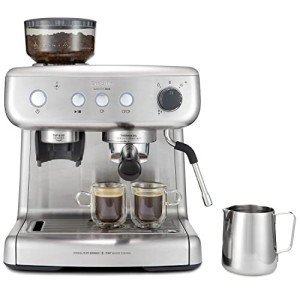The Ultimate Guide to Buying Espresso Coffee Machines
Espresso coffee machines have rapidly become a staple in households and cafes all over the world. With their ability to produce abundant, concentrated coffee quickly, many coffee fanatics prefer brewing espresso in the house rather than depending on cafe. Purchasing an espresso machine can be an overwhelming procedure, offered the myriad of alternatives offered in the market. This post supplies comprehensive insights into various kinds of espresso machines, key features to consider, and ultimately helps hopeful home baristas make an informed choice.
Comprehending Espresso Machines
There are a number of kinds of espresso machines, each developed for various user choices and requirements. Below is a table detailing the kinds of machines available:
| Type | Description | Pros | Cons |
|---|---|---|---|
| Manual Machines | Operated by hand, permitting complete control | Greater control & & quality Steeper knowing curve | |
| Semi-Automatic Machines | Integrates manual operation with automated features | Versatility and consistency | Needs more skill than totally automatic |
| Fully Automatic Machines | Automated brewing, making espresso with the push of a button | Convenience and consistency | Less control over the developing process |
| Pill Machines | Use pre-packaged capsules for developing | Very easy to use | Limited range and higher long-lasting cost |
| Super-Automatic Machines | Completely automated procedures including grinding & & brewing | All-in-one convenience | More expensive and less manual control |
Picking the best machine largely depends upon the user's familiarity with coffee brewing, wanted control level, and budget.
Secret Features to Consider
When searching for an espresso machine, numerous essential functions must be taken into consideration:
- Pressure: Look for a machine that operates at a minimum of 9 bars of pressure, which is optimum for extracting espresso.
- Boiler System: Machines may include single or dual boiler systems. Dual systems are considered more flexible as they can brew espresso and steam milk all at once.
- Milk Frothing Capability: For lattes and coffees, a good steam wand or automatic milk frothing alternative is essential.
- Size and Design: Consider the readily available space in the kitchen. Larger machines may use more features however need more counter space.
- Reduce of Cleaning: Look for machines with detachable parts and easy-to-clean surfaces, as routine upkeep is crucial to longevity.
- Personalization Options: Some machines use adjustable settings for temperature, volume, and strength. This function is considerable for individuals who delight in try out various tastes.
- Cost Range: Espresso machines can range from affordable to high-end models. Set Portable Espresso Machines that reflects your use frequency and concerns.
Budgeting for an Espresso Machine
Buying an espresso machine can differ extensively in price. It is important to establish a budget that aligns with your coffee intake and preferences. As a guide:
- Under ₤ 100: Entry-level capsule machines and basic manual machines.
- ₤ 100 - ₤ 500: Good quality semi-automatic machines with more features and much better build quality.
- ₤ 500 - ₤ 1,500: Professional-level machines providing innovative features, dual boilers, and boosted efficiency.
- ₤ 1,500 and above: High-end, commercial-grade machines designed for major lovers and coffee shop owners.
Upkeep and Care
Proper maintenance extends the life of an espresso machine and maintains the quality of the coffee. Here are some upkeep tips:
- Regularly clean the portafilter and other detachable parts.
- Descale the machine at advised intervals to avoid mineral accumulation.
- Rinse the steam wand after every use to eliminate milk residue.
- Check the water quality; using filtered water can substantially improve the taste and decrease scale.
Frequently asked questions
1. What is the best kind of espresso machine for beginners?
For novices, a semi-automatic espresso machine is often recommended, as it offers a balance of control and user-friendliness.
2. Can I make latte art with any espresso machine?
You can make latte art with machines that have a great steam wand or automatic milk frothing capabilities.
3. How often should I descale my espresso machine?
You must descale your espresso machine every 3 to six months, depending upon the firmness of your water and use frequency.
4. Is a more pricey machine worth the investment?
Generally, more expensive machines offer better develop quality, consistency, and feature sets, which can improve the total coffee experience. However, the value is subjective to user requirements.
5. Do I need a grinder, or are there machines that consist of one?
Some super-automatic and high-end machines featured integrated mills, while lower to mid-range models might require a separate grinder for ideal espresso extraction.
Acquiring an espresso machine is an amazing financial investment for coffee lovers and lovers. By understanding the various types, features, and crucial considerations involved, prospective buyers can discover the ideal machine to match their requirements. Whether it's the delight of crafting the ideal shot of espresso or gaining the ability to brew cafe-quality coffee at home, the right espresso machine can transform the daily coffee ritual into a delightful experience.

